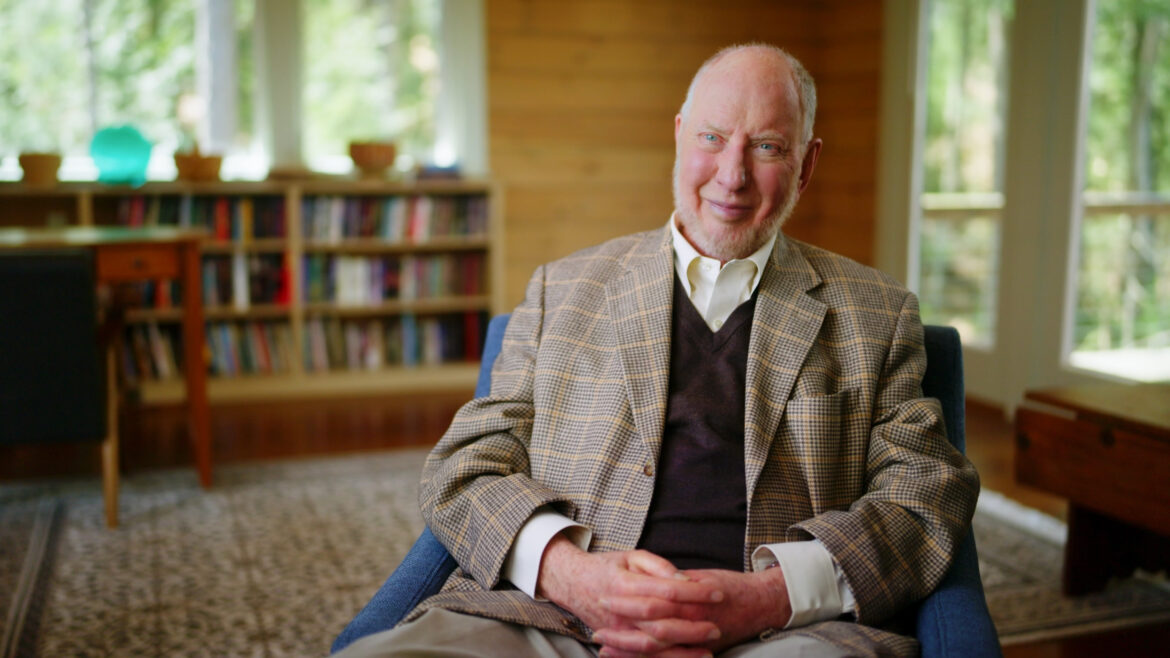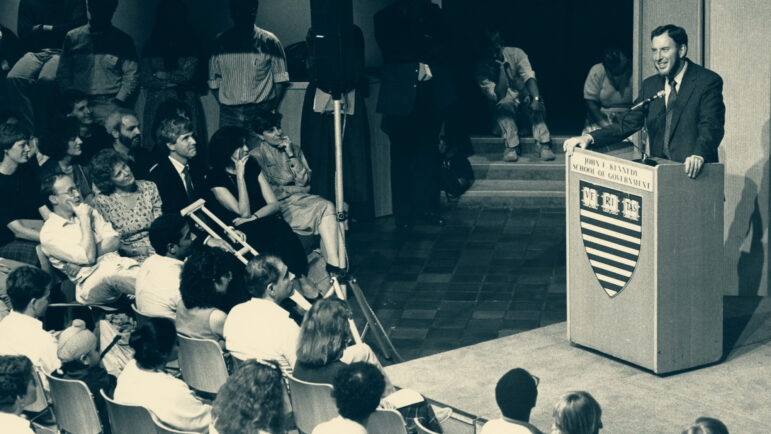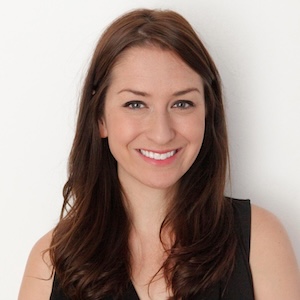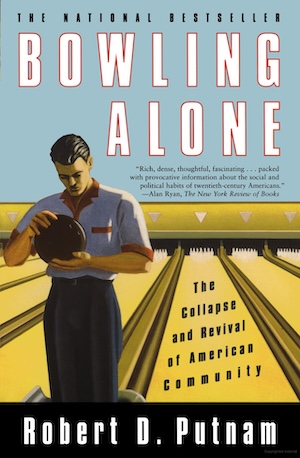Film revisiting ‘Bowling Alone’ revives calls for public media to focus on civic engagement

Putnam, author of "Bowling Alone," is the subject of a documentary featuring his work called "Join or Die."
Nearly 30 years ago, the political scientist Robert Putnam shook the media landscape when he published research explaining why Americans seemed to be increasingly disengaged with civics and their respective communities.
His 1995 paper in the Journal of Democracy went viral at the time. “Bowling Alone: America’s Declining Social Capital,” was featured by NPR, the New York Times, the Washington Post, People magazine and other national media outlets. Within weeks, Putnam’s research attracted many high-profile fans, including then-President Bill Clinton. In February 1995, he presented his research at Harvard’s John F. Kennedy School of Government, where he was a professor.

Now Putnam’s research and its continued relevance is the focus of a new documentary, Join or Die, and a campaign to bring renewed attention to his ideas. Paragon, a consulting firm that works with public media organizations, produced a webinar last month that aimed to highlight the role that public media can play in restoring civic life by bringing people together.
The webinar was co-sponsored by Current, the Public Media Content Collective and Public Media Co. Seth Resler, Paragon’s community-building consultant, moderated a discussion among panelists that included Join or Die co-director/producer Rebecca Davis, Paragon CEO Mike Henry, author and consultant Carrie Melissa Jones and Abdul El-Sayed, director of the Wayne County Department of Health, Human & Veterans Services in Detroit. Attendees were invited to prepare for the webinar by watching the film online.
Even more Americans ‘bowling alone’
Join or Die features interviews with Putnam and prominent political leaders, scholars and authors such as former Senator Hillary Clinton, Surgeon General Vivek Murthy, New York Times columnist David Brooks and Princeton professor Eddie Glaude Jr. It also spotlights people who have joined or started organizations in their local communities, such as clubs for Black bicyclers in Atlanta and the fraternal organization Oddfellows#80 in Waxahachie, Texas.
Join or Die also recounts how a plethora of local organizations have influenced culture, from Ben Franklin’s Junto club, to Phyllis Wheatley Clubs, the California Coast Girls Surf Club and the National Congress of American Indians. It highlights the civic engagement of key historical figures, such as how many clubs W. E. B. DuBois joined, and notes that Steve Jobs and Steve Wozniak formed their working relationship at a computer club before they founded Apple.

Rebecca Davis co-directed and co-produced Join or Die with her brother Pete, who had been a student of Putnam’s at Harvard. The siblings approached Putnam about the idea for the documentary in 2017, which was around the time he planned to retire from Harvard. Rebecca’s inspiration for the documentary came from her previous job as a senior producer for NBC News, where she regularly reported on school shootings, opioid addiction, rising suicide rates and social unrest, she said during the webinar.
“As I was talking to people, I was getting the sense from them that things in their communities were off,” Davis said. “So out of a personal need to work on something that zoomed out a little bit more, and not just keep covering the symptoms, we approached Bob to see how he felt about us revisiting his famous ‘Bowling Alone’ work.”
Putnam’s 2000 book, “Bowling Alone: The Collapse and Revival of American Community,” expanded on his theory connecting the decline of “social capital” in American society since 1950 to disengagement from community life. In general, his research found a correlation between Americans becoming less interested in community involvement, namely through joining clubs, and decreased voter turnout and engagement in civics.
Putnam’s connection to public media
When Putnam’s book was published, public TV leaders drew parallels between his research and the challenges they faced in preparing for the transition to digital broadcasting. Putnam was a keynote speaker at the 2000 PBS Development Conference and the 2001 PBS Annual Meeting in Philadelphia. At the 2001 meeting, PBS presented a strategic plan that described building social capital as a top priority. Station leaders who were developing new strategic concepts for community service also embraced his ideas.

In a 2001 interview with Current, Putnam said relabeling public media’s work to align with social capital concepts wouldn’t bring “a lot of gain” to stations on its own. To strengthen public media, stations needed to “figure out ways to get people to engage in community life.”
Ideas that gained currency then, and eventually came to fruition, were centering local stations as civic institutions that operate as media hubs within local communities, strengthening their brand identities in relation to PBS, and building partnerships with libraries, museums and other locally rooted organizations. Many public TV stations also invested in strengthening their work in local education and outreach.
During the webinar, Davis noted that many of the trends of declining social capital that Putnam documented, such as participation in community-based groups, have worsened. The panel agreed that civic disengagement mirrors some of the challenges that public media stations face in building local audiences and finding members to support their services to the community.
“We’ve got to put the ‘public’ back in public media,” said El-Sayed. “That doesn’t just mean that it’s being invested in by the public, but that it’s actually a space for civic engagement.”
Jones, co-author of “Building Brand Communities: How Organizations Succeed by Creating Belonging,” recommended that stations experiment with engagement strategies that bring members and audiences together and suggested investing in these projects for at least 18 months. “One event one time is a great start, but you’ve got to keep going,” she said.Paragon CEO Henry described watching Join or Die as a “eureka moment” for him. “I believe that if public media can be better caretakers for their local communities, then local communities will be supporters of public media.”





